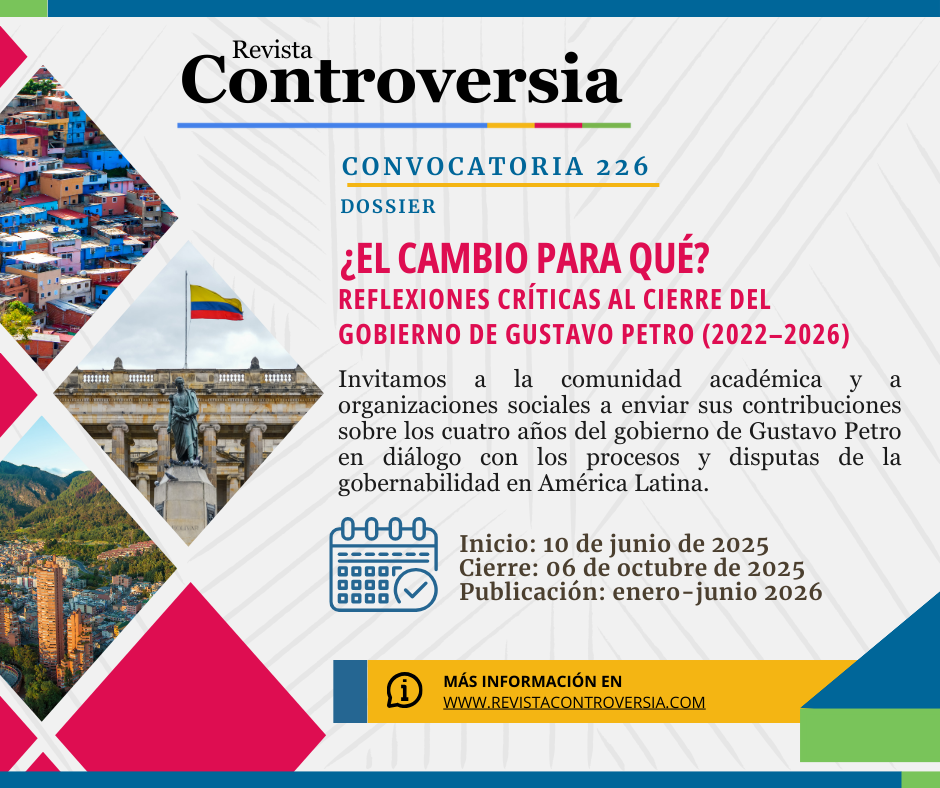Convocatoria Num. 226 (2026): Change for what? Reflecting critically on the end of Gustavo Petro's government (2022–2026).
As the government of President Gustavo Petro comes to an end and the 2026 electoral cycle approaches, it is important to create a space for critical reflection on the political, social, and economic processes that have characterised this period. The Government of the Historical Pact has centred its discourse and programmatic agenda around the notion of 'change'. However, this concept has given rise to multiple interpretations, as well as tensions and disputes within the national and continental political landscape.
Over the past four years, the Petro administration has confronted various national and international crises, in which the Executive has played a pivotal role alongside traditional and emerging actors in Colombian politics. The transformation proposals promoted by the government have generated expectations, uncertainties and intense debates about the scope of the reforms, their limitations, and the sectors that will be affected or benefit from them.
Similarly, policies that address structural issues such as social inequality, systemic violence, and the environmental crisis have been promoted. However, these initiatives have not been consolidated without opposition; they have instead sparked new controversies that demonstrate the complexity of any attempt to reconfigure the current political and economic model. In parallel, the reorganisation of institutional and social power relations has paved the way for new political and social actors to emerge and seek to influence the direction of the national project.
This scenario has also brought disputes over the management and distribution of political forces and economic resources to the forefront, as well as the ongoing demands of historically marginalised communities and territories for respect for, and guarantees of, their rights in contexts characterised by armed violence, structural disparities and ongoing exclusion.
Adopting Darío Echandía's iconic question, 'Power for what?', we pose a new question in this final phase of Petro's government: 'Change for what?' We therefore invite the academic community and social organisations to submit articles that critically address the dynamics of the 2022–2026 governmental period. Contributions will be especially valued if they:
- Analyse the advances, setbacks and ambiguities of the change project promoted by President Petro's government in the following areas: the economy, politics, society, peace-building (implementation of peace agreements) and international relations.
- Study the reform processes and how they are received in different social sectors.
- Analyse the Executive's relations with the other branches of government.
- Compare regional experiences in Latin America that shed light on similarities, differences or lessons learned that are relevant to the Colombian case.
- Consider the role of social movements, civil society and institutional actors in shaping the current political landscape.
Opening of the call for papers: 10 June 2026
Closing date for submissions: 6 October 2025
Publication of issue: first semester of 2026.

Editor: John Jairo Montoya (Cinep/PPP)
Submission of contributions
Contributions must comply with all the elements shown in the author guidelines, according to the type of text. Manuscripts can be submitted through the Open Journal System (OJS) platform. To do so, if it is your first submission you must register at the following link: Register | CONTROVERSIA JOURNAL or if you are already registered, you can Log in: Login | Revista Controversia If you require technical assistance, please contact controversia@cinep.org.co or revistacontroversia@gmail.com.


